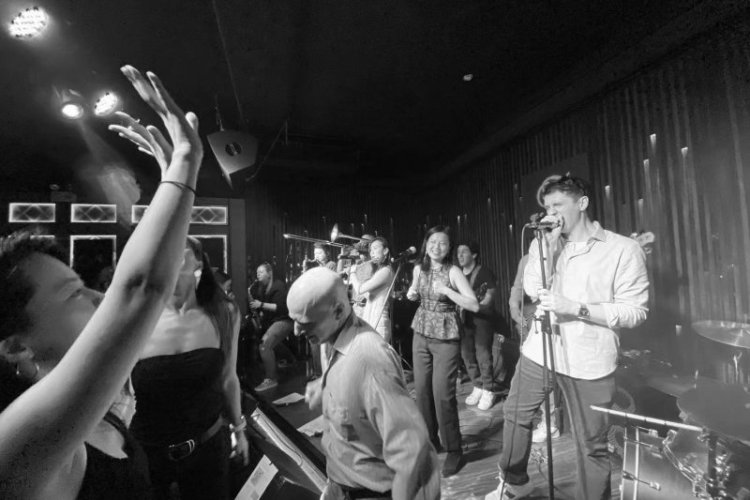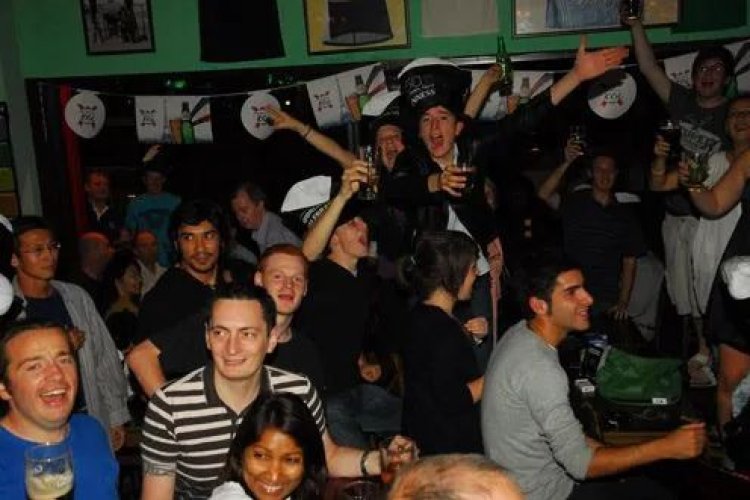L’Enfance Rouge: Songs of the Arab Spring
Please note that L'Enfance Rouge's lead singer, Francois R. Cambuzat, will be playing as L'Enfant Rouge.
Freedom was theirs—you could literally hear it. French-Italian avant-rock trio L’Enfance Rouge (which means ‘The Red Childhood’ in English) listened intently to those lyrics of liberation, shouted out by their Tunisian collaborators and friends. The post-revolutionary era was only two months old upon Rouge’s arrival in the capital of Tunis last year, and the expats eagerly soaked up songs of the Arab Spring.
“Now they can talk and sing about what they see, and do what they want,” says singer and guitarist Francois R. Cambuzat of the blooming scene where his band set up shop to record their latest album, a still untitled project tentatively due for release next year.
Below, Cambuzat describes why performing in such exotic locales (including a Beijing gig at Yugong Yishan on Friday June 29), makes Western venues pale in comparison.
Let’s start with the most obvious question—why record an album in post-revolutionary Tunisia?
I studied at Tunis’ National Conservatory of Music back in the early ‘80s. But we keep going back because of the open mindedness of the audiences there. They can go to a classical concerto performance with the same joy and power as a rock show. There’s no elevation of one music form over the other like in the West.
How has the revolution affected their music?
I like the lyrics now. There’s this guy called Bendir Man- before the revolution, he was in jail and could not play. His music was not politically correct. Now he can sing and really be heard.
What’s an example of his best lyrics?
He’s got one song where he makes fun of the way the West sees Tunisia, joking about how as soon as an Arab person goes abroad they’re considered terrorists. It’s really provocative.
How did Tunisia’s newly free environment impact your own writing and performing?
We were working with local composers and musicians, and they are the kings of melody. That was a huge challenge for a band like us, with all our minimalism and broken rhythms. One of the last people we got to work with was Lotfi Bouchnak, he’s a UN ambassador but he’s also considered to be one of the main voices of Arabic classical music. He insisted that we not make ‘world music,’ that we not focus on nations or separation, but instead just try to see which harmony can fit into different tones.
Since you enjoyed working in Tunisia so much, where would you like to record next?
Syria and Yemen, because their culture is completely different (from ours). We feel that we have more to learn from these countries.
So how do you plan to learn about Chinese music when you come to Beijing?
We are completely ignorant about Chinese music, aside from a few names like Mamer, that amazing folk singer. So we’d love to meet as many Chinese musicians as we can. The fact is that we will all die too soon (laughs), we have a very short time to fulfil our curiosities. So for us it is so much more appealing to play in China or Tunisia than New York or Paris.
L’Enfance Rouge will perform at Yugong Yishan on Fri Jun 29. For more information visit yugongyishan.com or enfancerouge.net.
Photo courtesy of Wangba Music
Related stories :
Comments
New comments are displayed first.Comments
![]() JWhite
Submitted by Guest on Thu, 06/28/2012 - 19:19 Permalink
JWhite
Submitted by Guest on Thu, 06/28/2012 - 19:19 Permalink
Re: L’Enfance Rouge: Songs of the Arab Spring
Thanks for pointing that out, Badr. We've amended the blog to reflect that.
![]() badr
Submitted by Guest on Thu, 06/28/2012 - 19:03 Permalink
badr
Submitted by Guest on Thu, 06/28/2012 - 19:03 Permalink
Re: L’Enfance Rouge: Songs of the Arab Spring
hey guys..
just a note that l'enfance rouge will not be playing in Beijing. Their lead singer, Francois Cambuzat, is the only one in town and will be appearing under the stage name: "l'enfant rouge"... just to get the right info there.
Validate your mobile phone number to post comments.






